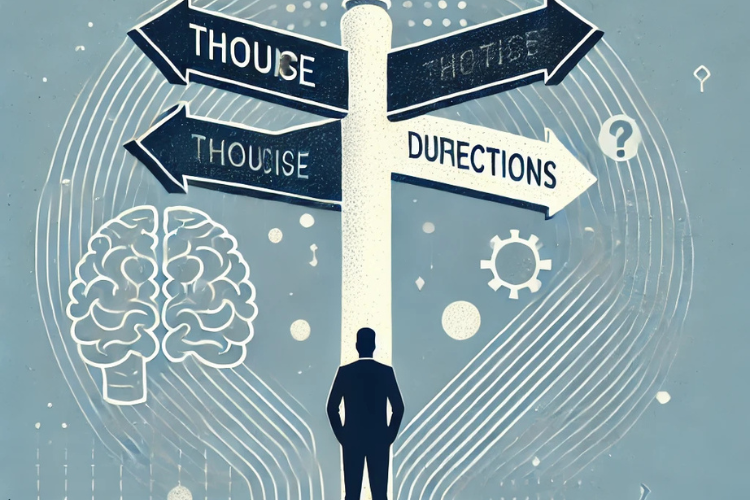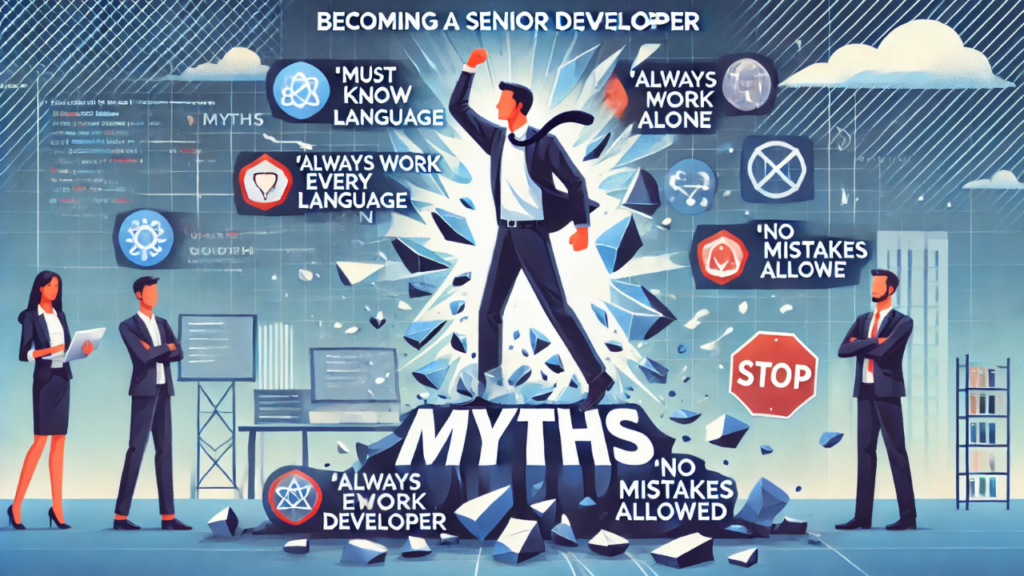Introduction
Many junior developers have misconceptions about what it takes to become a senior developer. They often imagine a role filled with exciting projects, cutting-edge tech, and complete autonomy. However, the reality is quite different.
Becoming a senior developer isn’t about knowing everything. It’s about problem-solving, adapting to challenges, and understanding business needs. This blog debunks six common myths junior developers believe about senior roles and provides insights into what it truly means to be a senior developer.
1. Seniors Have All the Answers
Expectation:
Senior developers can solve any issue instantly. They always know what’s wrong with the code.
Reality:
The more you learn, the more you realize how much you don’t know. Even the most experienced developers face complex problems they can’t solve immediately.
Seniority isn’t about having all the answers. It’s about knowing how to find them. Seniors excel at debugging, researching, and asking the right questions. They also collaborate with others to resolve issues efficiently.
Many developers, regardless of experience, rely on resources like Stack Overflow, documentation, and peers. The real skill is in knowing where to look and how to apply that knowledge effectively.
How to Prepare for This Reality:
- Practice debugging strategies and learn how to break down problems into smaller parts.
- Develop strong research skills to quickly find reliable solutions.
- Cultivate a mindset of continuous learning and curiosity.
Key Takeaway:
A great senior developer is resourceful, not all-knowing. Focus on improving your problem-solving skills and learning how to navigate challenges.
2. Working with the Latest Tech
Expectation:
Senior developers work with cutting-edge technologies and innovative tools every day.
Reality:
Most companies rely on legacy systems. These systems contain years of business logic and crucial operational data. Maintaining and improving them is a significant part of a senior developer’s job.
Yes, seniors may work on new technologies occasionally, but they also need to optimize and refactor older codebases. Understanding legacy systems is often more valuable than learning the latest framework. Companies prioritize stability, and upgrading systems requires careful planning and approval.
Additionally, working with legacy systems teaches essential skills like debugging, refactoring, and backward compatibility, which are invaluable for career growth.
How to Prepare for This Reality:
- Gain experience with older codebases and learn best practices for maintaining them.
- Understand how to refactor code while minimizing risks.
- Balance learning new technologies with mastering foundational programming skills.
Key Takeaway:
Mastering the fundamentals of software development is more important than chasing trends. Focus on writing clean, efficient, and maintainable code.
3. No More Boring Tasks
Expectation:
As a senior, you can avoid mundane tasks like documentation and meetings.
Reality:
Senior developers handle more administrative tasks than juniors. Code reviews, documentation, and meetings become a regular part of the job.
These tasks might not be exciting, but they are essential. Code reviews improve code quality. Documentation ensures knowledge sharing. Meetings align teams and prevent miscommunication.
Senior developers also take on additional responsibilities, such as mentoring junior developers, planning projects, and ensuring best practices are followed. These tasks contribute to overall team efficiency and project success.
How to Prepare for This Reality:
- Develop good documentation habits to make your code understandable for others.
- Learn effective communication skills to contribute meaningfully to meetings.
- Take an interest in mentoring and helping others grow.
Key Takeaway:
Embrace the non-coding aspects of your role. Strong communication and documentation skills will make you a better senior developer.
4. Making Big Changes
Expectation:
As a senior, you can introduce major improvements whenever you want.
Reality:
Big changes require approval. Management considers the business impact, budget, and risks before approving modifications.
A senior developer must present ideas persuasively. They need to align improvements with business goals and demonstrate the value of proposed changes. Patience and planning are essential.
How to Prepare for This Reality:
- Learn how to present technical ideas to non-technical stakeholders.
- Understand how to balance technical improvements with business priorities.
- Work on your ability to advocate for your ideas while being open to feedback.
Key Takeaway:
Learn how to present your ideas effectively. Show decision-makers why your changes will benefit the company.
5. Time to Relax
Expectation:
Once you’re senior, you can take it easy. Less stress, fewer late nights.
Reality:
Responsibilities increase with seniority. You may need to work after hours to meet deadlines or fix urgent issues. Seniors also mentor juniors, review code, and plan projects.
While experience allows you to work more efficiently, leadership responsibilities add pressure. Balancing technical work and leadership duties can be challenging.
How to Prepare for This Reality:
- Develop time management skills to balance workload efficiently.
- Set boundaries to prevent burnout while managing responsibilities.
- Learn how to prioritize tasks and delegate when necessary.
Key Takeaway:
Being a senior developer requires time management and prioritization. Prepare for increased responsibility, not less work.
6. Deciding What to Do
Expectation:
Senior developers have full control over projects and make all key decisions.
Reality:
Seniors have influence but still collaborate with teams, managers, and stakeholders. They must align decisions with company objectives and client requirements.

Technical skills alone don’t guarantee autonomy. Soft skills, teamwork, and strategic thinking matter just as much.
How to Prepare for This Reality:
- Improve leadership and collaboration skills.
- Learn to align technical decisions with business goals.
- Develop the ability to manage stakeholder expectations.
Key Takeaway:
Develop strong leadership and communication skills. Seniority is about guiding teams, not working alone.
Conclusion
The transition from junior to senior developer comes with many unexpected realities. Seniority isn’t about knowing everything or working with the latest tools. It’s about problem-solving, communication, and adaptability.
If you want to grow into a senior role, focus on mastering core development skills, improving your ability to work with others, and understanding business needs.
At StartupHakk, we help aspiring developers gain real-world experience. If you’re looking to fast-track your journey into software development, check out our programs and start building your future today!




